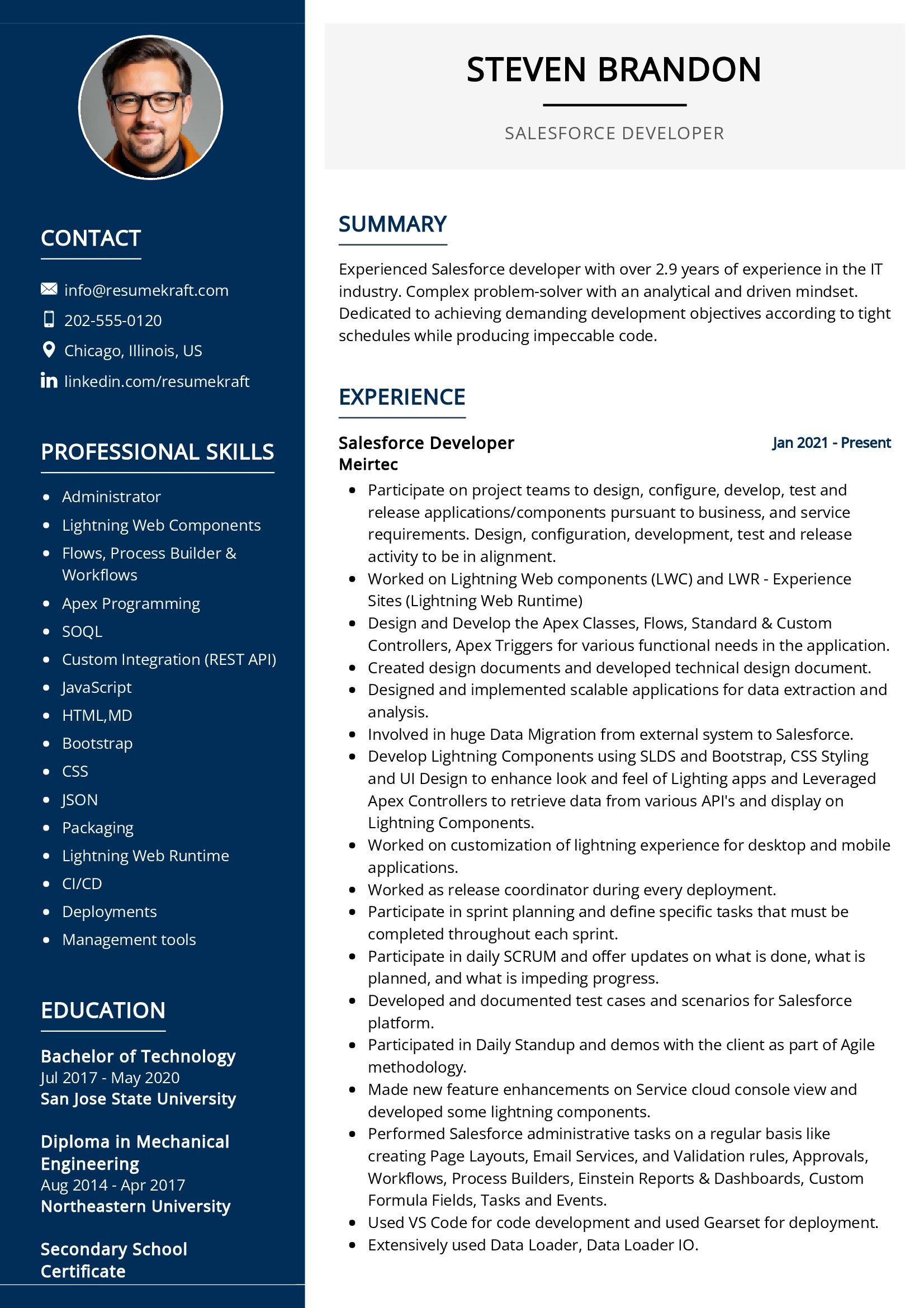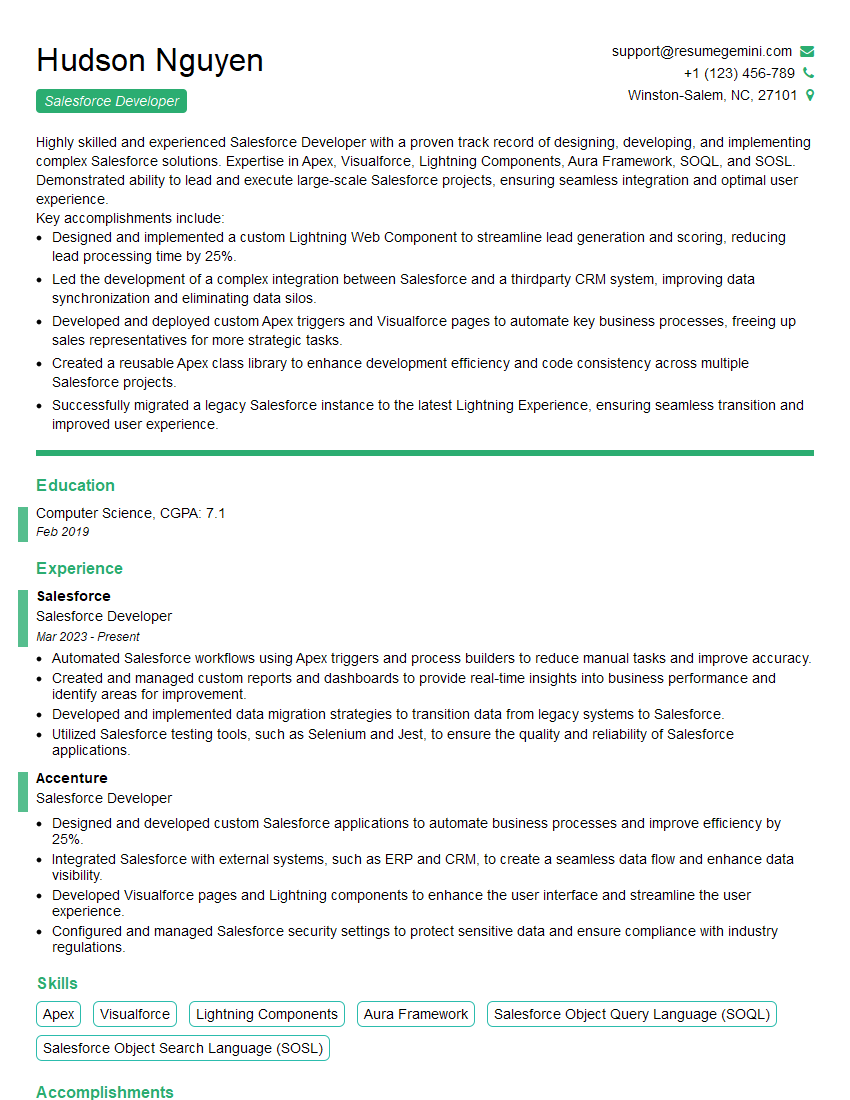The Salesforce CPQ Developer Resume That Will Get You Hired
The Salesforce CPQ (Configure, Price, Quote) developer role is in high demand, offering a lucrative career path for skilled professionals. But navigating the job market requires more than just technical expertise; it demands a resume that clearly showcases your abilities and experience. This comprehensive guide will equip you with the knowledge and strategies to craft a Salesforce CPQ developer resume that will stand out and land you interviews. We’ll cover everything from formatting and content to keyword optimization, ensuring your application gets noticed by hiring managers and recruiters.
Understanding the Salesforce CPQ Developer Role
Before diving into resume specifics, let’s clarify what a Salesforce CPQ developer does. This role involves:
- Configuration: Building and maintaining CPQ configurations to meet business needs, including product catalogs, pricing rules, and discount structures.
- Customization: Developing custom solutions using Apex, Visualforce, and Lightning Web Components (LWC) to extend CPQ functionality.
- Integration: Integrating CPQ with other Salesforce modules and external systems.
- Testing and Debugging: Ensuring the CPQ system functions correctly and troubleshooting any issues.
- Documentation: Creating and maintaining technical documentation.
Your resume should highlight your proficiency in these areas.
Crafting the Perfect Salesforce CPQ Developer Resume: Key Sections
A well-structured resume is the foundation of a successful job application. Here’s a breakdown of the essential sections and how to optimize them for the Salesforce CPQ developer role:
1. Contact Information:
- Clear and Concise: Include your full name, phone number, professional email address (e.g., firstname.lastname@email.com), and LinkedIn profile URL.
- Avoid Unprofessional Email Addresses: Use a professional-sounding email address.
- Location: City and state are sufficient; no need for a full address.
2. Summary/Objective (Optional, but Recommended):
Tailor It: Customize this section for each job application.
Highlight Value: Briefly summarize your key skills, experience, and career goals, focusing on what you can offer the potential employer.
Keywords are Crucial: Use relevant keywords like “Salesforce CPQ,” “Apex,” “Visualforce,” “Lightning Web Components (LWC),” and other technologies mentioned in the job description.
Example: “Results-driven Salesforce CPQ Developer with 5+ years of experience in designing, developing, and implementing CPQ solutions. Proven ability to configure complex pricing models, build custom applications using Apex and LWC, and integrate CPQ with other Salesforce modules. Seeking a challenging role where I can leverage my expertise to optimize sales processes and drive revenue growth.”
3. Skills Section:
- Comprehensive and Accurate: List your technical skills in a clear and organized manner.
- Categorize for Clarity: Consider organizing skills into categories like:
- CPQ Specific Skills: Salesforce CPQ, Product Configuration, Pricing Rules, Quote Templates, Discounting, Bundling, Advanced Approvals
- Programming Languages: Apex, Visualforce, Lightning Web Components (LWC), JavaScript, HTML, CSS
- Salesforce Technologies: Salesforce Platform, Sales Cloud, Service Cloud, Custom Objects, Workflow Rules, Process Builder, Triggers, SOQL, SOSL
- Development Tools: Salesforce Developer Console, VS Code, Git, Workbench
- Integration Skills: REST APIs, SOAP APIs, Integration Platforms (e.g., MuleSoft, Dell Boomi)
- Databases: SQL
- Methodologies: Agile, Scrum
- Prioritize Relevant Skills: Put the most important skills for the specific job you are applying for at the top.
- Quantify Where Possible: Include the number of years of experience with each skill.
4. Experience Section:
Reverse Chronological Order: Start with your most recent job and work backward.
Clear Job Titles: Use clear and concise job titles that reflect your responsibilities (e.g., “Salesforce CPQ Developer,” “Salesforce Consultant - CPQ Specialist”).
Detailed Descriptions: For each role, provide a detailed description of your responsibilities and accomplishments.
Action Verbs: Start each bullet point with strong action verbs (e.g., “Developed,” “Implemented,” “Managed,” “Optimized,” “Configured”).
Quantify Results: Use numbers and metrics to demonstrate the impact of your work (e.g., “Improved quote generation time by 30%,” “Reduced errors by 20%”).
Focus on CPQ Projects: Highlight your experience with CPQ projects, including:
- Configuration and Customization: Describe your experience with product configuration, pricing rules, quote templates, and custom development.
- Implementation and Integration: Detail your involvement in CPQ implementations and integrations with other systems.
- Problem Solving: Explain how you addressed technical challenges and improved CPQ performance.
Keywords are Key: Naturally weave in relevant keywords throughout this section.
Example:
- Salesforce CPQ Developer, ABC Company, 2019 – Present
- Developed and implemented custom CPQ solutions using Apex and LWC to meet specific business requirements.
- Configured complex pricing rules and discount structures, resulting in a 15% increase in sales.
- Integrated CPQ with the company’s ERP system using REST APIs.
- Reduced quote generation time by 25% through optimization of quote templates.
- Salesforce CPQ Developer, ABC Company, 2019 – Present
5. Education Section:
- Relevant Degrees: Include your degree(s), university name, and graduation date.
- Certifications: List any relevant Salesforce certifications, such as:
- Salesforce Certified CPQ Specialist
- Salesforce Certified Platform Developer I/II
- Salesforce Certified Administrator
- Order of Importance: Place certifications above degrees if they are more relevant to the role.
Optimizing Your Resume for Applicant Tracking Systems (ATS)
Many companies use ATS to screen resumes. Here’s how to make sure your resume gets past the bots:
- Keyword Optimization: Carefully review the job description and incorporate relevant keywords throughout your resume, particularly in the summary/objective, skills section, and experience descriptions.
- Use Standard Formatting: Avoid complex formatting, tables, and graphics that can confuse ATS. Stick to a clean, easy-to-read format.
- Choose the Right File Type: Submit your resume as a .doc or .pdf file (check the job posting’s requirements).
- Proofread Carefully: Errors can be detrimental. Ensure your resume is free of typos and grammatical errors.
Tailoring Your Resume for Each Application
- Read the Job Description: Carefully analyze the job description and highlight the skills and experiences that align with the requirements.
- Customize Your Resume: Modify your summary/objective, skills section, and experience descriptions to match the specific job posting.
- Research the Company: Learn about the company’s products, services, and values, and tailor your resume to demonstrate how your skills and experience align with their needs.
Conclusion: Landing Your Dream Salesforce CPQ Developer Job
Crafting a compelling Salesforce CPQ developer resume is an investment in your career. By following these guidelines, you can create a resume that showcases your technical skills, experience, and achievements, increasing your chances of landing interviews and ultimately securing your dream job. Remember to continuously update your resume as you gain new skills and experience. Good luck!
Frequently Asked Questions (FAQs)
1. What are the most important keywords to include in a Salesforce CPQ developer resume?
The most important keywords include “Salesforce CPQ,” “Apex,” “Visualforce,” “Lightning Web Components (LWC),” “Product Configuration,” “Pricing Rules,” and any technologies or platforms mentioned in the specific job description.
2. Should I include a cover letter?
Yes, a cover letter is highly recommended. It provides an opportunity to personalize your application, elaborate on your skills and experience, and express your interest in the specific role and company.
3. How much experience is typically required for a Salesforce CPQ developer role?
The required experience varies depending on the role and company, but most positions require at least 2-3 years of experience with Salesforce CPQ. More senior roles may require 5+ years of experience.
4. Are Salesforce certifications essential for a Salesforce CPQ developer role?
While not always mandatory, Salesforce certifications, particularly the Salesforce Certified CPQ Specialist certification, significantly increase your chances of getting hired. They demonstrate your knowledge and commitment to the platform.
5. How can I demonstrate my experience if I haven’t worked on a CPQ project directly?
If you lack direct CPQ experience, highlight any related Salesforce experience, such as experience with Sales Cloud, Custom Objects, and Apex development. Also, emphasize any transferable skills, such as your ability to configure, customize, and integrate Salesforce solutions. Focus on your willingness to learn and your ability to quickly grasp new technologies.



